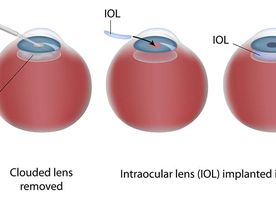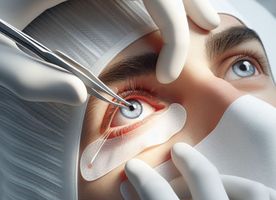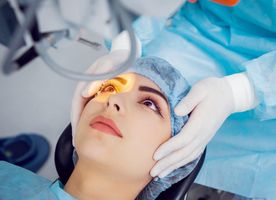Ophthalmology in South Korea
Search and Compare the Best Clinics and Doctors at the Lowest Prices for Ophthalmology in South Korea
Gachon University Gil Medical Center





Ophthalmology at Gachon University Gil Medical Center in Incheon, South Korea
Alpha Seoul Eye Clinic





Ophthalmology at Alpha Seoul Eye Clinic in Bundang, South Korea
Eyeonce Eye Clinic





Ophthalmology at Eyeonce Eye Clinic in Seoul, South Korea
Samsung Medical Center





Ophthalmology at Samsung Medical Center in Seoul, South Korea
Dongguk University Ilsan Medical Center





Ophthalmology at Dongguk University Ilsan Medical Center in Ilsan, South Korea
Wonkwang University Hospital





Ophthalmology at Wonkwang University Hospital in Iksan, South Korea
CNU Hwasun Hospital



Ophthalmology at CNU Hwasun Hospital in Bundang, South Korea
BGN Eye Clinic Jamsil Lotte Tower





Ophthalmology at BGN Eye Clinic Jamsil Lotte Tower in Seoul, South Korea
POP Plastic Surgery & Skin





Ophthalmology at POP Plastic Surgery & Skin in Seoul, South Korea
Chung-Ang University Hospital





Ophthalmology at Chung-Ang University Hospital in Seoul, South Korea
Sun Medical Center





Ophthalmology at Sun Medical Center in Daejeon, South Korea
Hanyang University Medical Center





Ophthalmology at Hanyang University Medical Center in Seoul, South Korea
Cheil General Hospital & Women's Healthcare Center





Ophthalmology at Cheil General Hospital & Women's Healthcare Center in Seoul, South Korea
Kyung Hee University Hospital





Ophthalmology at Kyung Hee University Hospital in Seoul, South Korea
Seoul National University Hospital





Ophthalmology at Seoul National University Hospital in Seoul, South Korea
Severance Hospital





Ophthalmology at Severance Hospital in Seoul, South Korea
B and VIIT Eye Center





Ophthalmology at B and VIIT Eye Center in Seoul, South Korea
BGN Eye Clinic Gangnam Kyobo Tower





Ophthalmology at BGN Eye Clinic Gangnam Kyobo Tower in Seoul, South Korea
Glory Seoul Eye Clinic





Ophthalmology at Glory Seoul Eye Clinic in Seoul, South Korea
BalGeunSeSang Eye Clinic





Ophthalmology at BalGeunSeSang Eye Clinic in Seoul, South Korea
Our partner clinics in South Korea are accredited by the following associations



































































































































No Time?
Tell us what you're looking for and we'll reach out to the top clinics all at once
WHY US?



































































































































No Time?
Tell us what you're looking for and we'll reach out to the top clinics all at once
















Ophthalmology is a branch of medicine and surgery that focuses on the diagnosis and treatment of eye disorders. Medically trained doctors who care for patients who have eye and vision conditions are called ophthalmologists and are the only practitioners diagnosed and trained to treat all eye and vision problems. Their practice is very diverse, dealing with a wide range of issues and clinical conditions. Some of the most common conditions that they treat and manage include:
- Minor and major eye injuries
- Infectious eye disease
- Dry eyes
- Proptosis (bulged eyes)
- Glaucoma
- Cataracts
- Corneal pathology
- Retinal problems, such as bleeding and detachment or tears of the retina
- Squints
- Eye-related neurological problems
- Excessive tearing
- Intraocular inflammation
- Chronic eye diseases, such as age-related macular degeneration and diabetic retinopathy.
An ophthalmologist can offer a wide range of medical services, including surgical eye procedures. Some of the most common procedures that ophthalmologists perform are as follows:
- Eye examinations.
- Specialized tests, such as ultrasonography of the eyes and optical coherence tomography (OCT).
- Refractive surgery to correct vision, such as LASIK.
- Cataract surgery.
- Glaucoma surgery.
- Cancer treatment.
- Reconstructive surgery to repair birth abnormalities or trauma, such as crossed eyes.
- Neoplasm removal.
- Corneal transplants.
- Repairing torn or detached retinas.
- Strabismus surgery.
- Oculoplastic surgery (plastic surgery around the eye).
- Prescribing and fitting glasses and contact lenses.
How Long Should I Stay in South Korea?
Your length of stay depends on the type of treatment you undergo. In general, you may need to stay in South Korea for at least a week or to let your eyes recover and to attend follow-up checkups, where your ophthalmologist checks your condition and make sure that your eyes are healing properly. If everything is fine, they will allow you to leave for home. However, for some surgery, such as retinal detachment surgery, you should avoid flying until your eyes have fully healed. Therefore, it is best that you wait 3 to 4 weeks, sometimes even longer, before you travel home.
What's the Expected Recovery Time?
Recovery time depends on the type of surgery you underwent, your age, and overall health. It is generally recommended to rest your eyes for a few days. With LASIK, you may be able to return to work after a day. After a corneal transplant, you should wait for 2 to 3 weeks until you go back to work.
What Aftercare is Required?
Your ophthalmologist will give you instructions to care for your eye after the procedure. It is crucial that you follow all of them to have a quick recovery and obtain optimum results. To keep the result or to prevent complications, you will need to make some lifestyle changes, such as avoid smoking and staying active. You also need to attend regular checkups, typically once a year, with your local eye doctor or your ophthalmologist in South Korea.
What's the Success Rate?
Thanks to the continuous advancement of ophthalmology, eye treatments, and surgeries are now highly successful and safe. For instance, the latest research of LASIK showed that it has a 99% success rate in achieving 20/40 vision or better, whereas the success rate of corneal transplant is as high as 90%. However, it is important to be aware of the risks and side effects of eye treatments and surgeries, such as dry eyes, temporary visual problems, overcorrections, under correction, astigmatism, regression, and, very rarely, vision loss.
Are there Alternatives?
For some eye problems, you may be able to go to an optometrist as an alternative. However, if your conditions need to be treated through surgery, your optometrist will refer you to an ophthalmologist.
This information has been accurately sourced and verified by a medical professional for its accuracy, however, we strongly recommend you to consult with your doctor before pursuing medical procedures overseas.











